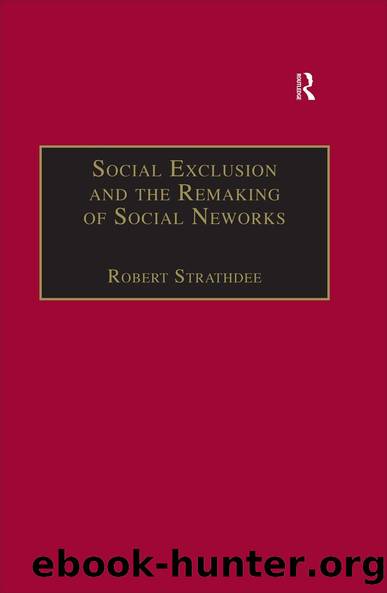Social Exclusion and the Remaking of Social Networks by Robert Strathdee

Author:Robert Strathdee [Strathdee, Robert]
Language: eng
Format: epub
Tags: Social Science, Poverty & Homelessness
ISBN: 9781351899536
Google: FkxBDgAAQBAJ
Publisher: Routledge
Published: 2017-03-02T03:25:23+00:00
The National Certificate of Educational Achievement in New Zealand9
The NCEA is designed to raise standards, increase the length of time students stay in education, create a lifelong learning culture, increase the status of vocational subjects, and convey valuable information to employers. The NCEA is also designed to create flexible learning pathways by, for instance, allowing individuals to study at more than one institution for a single award. Both initiatives are backed by financial support. Until recently, assessment practices were market-led in the sense that schools could choose whether they offered standards-based assessment linked to the NQF or retain the traditional system of norm-referenced assessment which functions outside the NQF. However, under the NCEA all learners are required to work towards a single award and have their learning assessed against predetermined standards. Policy-makers hope that the new award will be a motivating and relevant qualification which will help create pro-learning identities. However, despite its merits, it is doubtful whether the new award will have the desired effects or provide a solution to disruption. To make this case, it is useful to briefly review the NCEA and to assess its likely impact.
As noted, in New Zealand the original plan was to introduce a unified qualifications framework. Academic and vocational learning were to be measured in the same way, a common grading system was to be used, and a single ladder of progression was to be developed. However, although the NCEA was first mooted in the early 1990s as a replacement for the traditional, selective forms of assessment, the election of a conservative administration which supported selective assessment methods and held a cynical view of human potential delayed its introduction. Moreover, the early vision of creating a unified framework was also resisted by elites, universities, and students who favoured selective examinations that held the promise of social mobility. As a result, New Zealand operated a dual system of assessment, limiting the ability of the Framework to assist discouraged workers to become more motivated towards learning (Fitsimmons, 1997; Strathdee and Hughes, 2000). Following the election of the Labour-led Coalition, policy-makers turned their attention back to the NCEA, which was introduced from 2002 as the major school-leaving qualification. The NCEA is designed so that vocational and academic learning will count towards a single award. As a result, the number of young people having learning assessed against standards has increased dramatically.
The Labour-led Coalition deserves credit for tackling the vexing issue of assessment and curriculum reform: however, changes introduced to the NCEA since its conception to accommodate conservative interests mean that it is unlikely to contribute greatly to a solution for disruption. Although all secondary students, irrespective of the nature of courses of study, now work towards one qualification, the way in which learning is recognised in âacademicâ and âvocationalâ courses continues to differ. In vocational and academic areas learning is measured against predetermined standards of achievement. However, learning in academic areas is graded so that satisfactory work, good work, and excellent work can be recognised with âcreditâ, âmeritâ and âexcellenceâ grades.
Download
This site does not store any files on its server. We only index and link to content provided by other sites. Please contact the content providers to delete copyright contents if any and email us, we'll remove relevant links or contents immediately.
Collaborating with Parents for Early School Success : The Achieving-Behaving-Caring Program by Stephanie H. McConaughy; Pam Kay; Julie A. Welkowitz; Kim Hewitt; Martha D. Fitzgerald(899)
Entrepreneurship Education and Training: The Issue of Effectiveness by Colette Henry Frances Hill Claire Leitch(665)
Adding Value to Policy Analysis and Advice by Claudia Scott; Karen Baehler(499)
Materializing the Middle Passage by Jane Webster;(497)
Race and American Political Development by unknow(488)
Sociological Perspectives of Health and Illness by Constantinos N. Phellas(478)
American Government and Politics Today by Steffen W. Schmidt Mack C. Shelley Barbara A. Bardes(477)
Human and Global Security : An Exploration of Terms by Peter Stoett(473)
Control Of Oil - Hardback by Kayal(467)
Advances in Child Development and Behavior, Volume 37 by Patricia J. Bauer(403)
The Disappearance of Rituals: A Topology of the Present by Byung-Chul Han(401)
The Catholic Church and European State Formation, AD 1000-1500 by Jørgen Møller(392)
The World According to China by Elizabeth C. Economy(382)
Theories of Counseling and Psychotherapy: A Case Approach by Nancy L. Murdock(371)
Left Is Not Woke by Susan Neiman(370)
Application of classical statistics, logratio transformation and multifractal approaches to delineate geochemical anomalies in the Zarshuran gold district, NW Iran by unknow(364)
Cross-Cultural Child Development for Social Workers by Lena Robinson(358)
Turkey's Relations with the West and the Turkic Republics: The Rise and Fall of the Turkish Model by Idris Bal(353)
Japan's Ainu Minority in Tokyo by Mark K. Watson(340)
